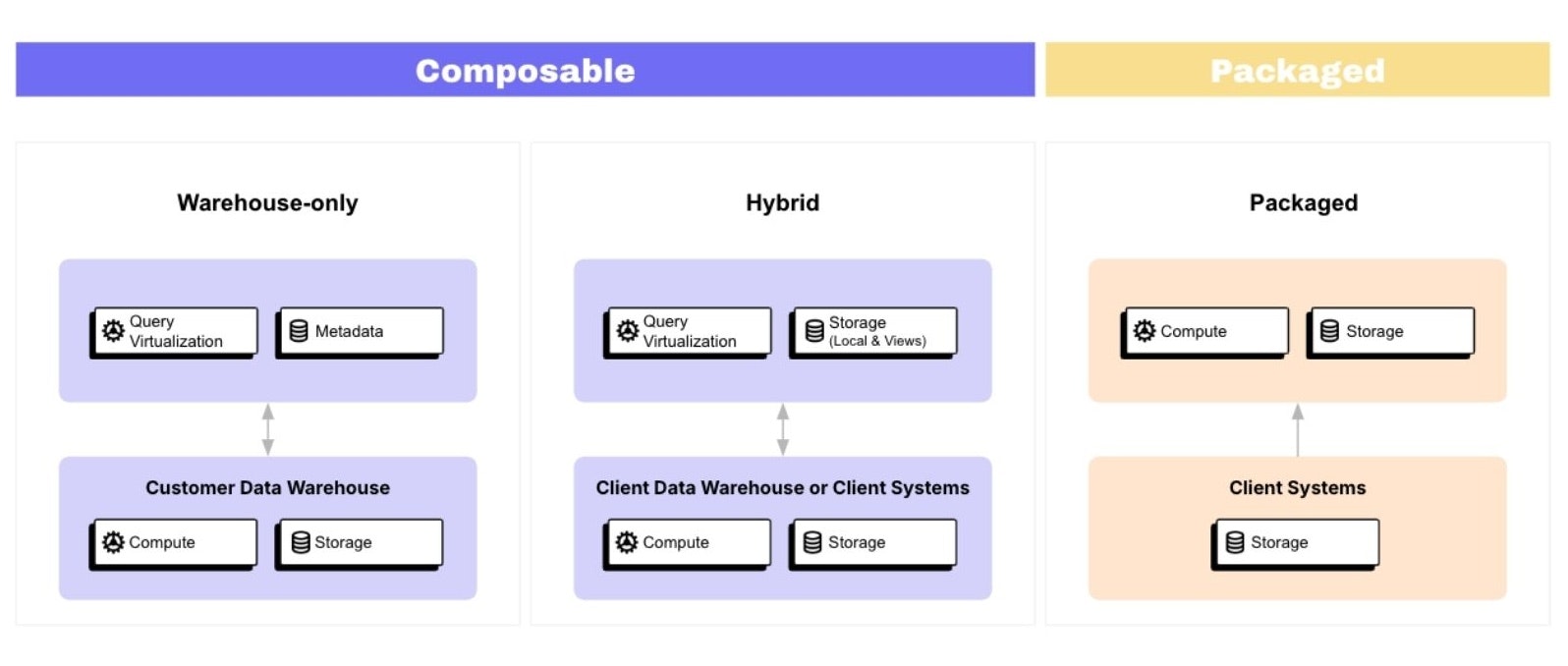
Data hosting: The foundation of usable customer data
7min • Last updated on Sep 9, 2025

Olivier Renard
Content & SEO Manager
According to the Veeam Data Protection Trends Report, 76% of organisations suffered a ransomware attack in the past 12 months. The question is no longer whether it will happen, but when. 9 out of 10 business leaders plan to strengthen their protection measures in light of this threat.
In this context, data hosting has become a strategic issue for every organisation. Compliance, performance and data security: it all starts with choosing the right infrastructure.
Key takeaways:
Data hosting refers to all the technical solutions that enable data storage and access.
There are several types of data hosting: public cloud, private cloud, hybrid cloud or on-premise – each with its own advantages in terms of security, flexibility and cost.
Security, compliance, efficiency and sovereignty are all factors to consider when hosting and using customer data.
Hosting has a direct impact on marketing performance. The choice between a packaged CDP and a composable CDP determines how data is stored, secured and activated.
🔍 Learn about data hosting and the criteria to consider depending on your business challenges. Discover how to link hosting, governance, and marketing performance within a modern approach to customer data. 📊
What is data hosting?
Data hosting refers to all the technical solutions used to store digital data on servers.
This data can then be accessed, modified or transferred according to user needs.
In a professional setting, the purpose of data hosting is to make data accessible, secure and usable at any time. It supports business applications, powers analytics, and enables activation within day-to-day tools (CRM, marketing or BI).
💡 Suitable hosting is a technical prerequisite for any data-driven approach: from governance to marketing activation, performance depends on the model chosen.
The different types of data hosting
There are several hosting types, each with its own features, specific benefits, and limitations.
Type | Definition | Advantages | Limitations |
|---|---|---|---|
Public cloud | Data is hosted on shared, secure, and compartmentalised servers, accessible via the Internet. | Flexibility, cost-effective, high availability. | Shared infrastructure, increased dependency, reduced customisation. |
Private cloud | Dedicated hosting for a single organisation. | Enhanced security, greater control, easier compliance. | More expensive, less flexible than public cloud. |
Hybrid cloud | Combines multiple environments (on-premise, private/public cloud). | Ideal for complex systems, balance between control & agility. | More technical to manage, requires stronger governance. |
On-premise | Data is stored on internal company servers. | Full control, local hosting, no external dependency. | High infrastructure costs, internal maintenance. |
Main types of data hosting
According to IDC, non-cloud infrastructure spending is expected to account for only 21.2% by 2028.
Other ‘traditional’ data hosting solutions exist, such as VPS (Virtual Private Server) or dedicated servers. These are still used for specific projects, but are often less agile than cloud architectures.
Cloud technologies are more modular, scalable, and business-oriented, and lie at the heart of the modern data stack.
How does data hosting work?
Data is hosted on physical or virtual servers, located in data centres. These centres handle data storage, backup and replication, as well as scaling based on volume and usage.
Access is secured through networks and specific user/tool permissions. Monitoring systems ensure continuous data availability, resilience and security.
Some of the best-known data hosting providers include AWS, Google Cloud, Azure, and European providers such as OVHcloud, Scaleway, or Infomaniak.
Security, compliance and sovereignty concerns
Hosting data securely
Data storage involves major security challenges. To avoid leaks or breaches, hosting providers implement numerous protective measures, including data encryption, strong authentication, and access control based on user permissions.
Various certifications provide reliability assurance: ISO 27001 (information security), SOC 2 (internal controls), Cyber Essential Plus or NHS standards for hosting health data. These certifications ensure adherence to strict standards regarding risk management and sensitive data protection.
Security is not just about cyber attacks. It also involves preventing accidental loss, detecting incidents, and quickly restoring data when issues arise.
Complying with regional data protection regulations
Data hosting must also comply with applicable regulations. The GDPR in UK and Europe, CCPA in California, and HIPAA in the US govern how data is collected, stored and transferred.
Two core concepts are central:
Data residency: where is your data geographically stored?
Data ownership: do you have the ability to control and freely manage your data?
Hosting data in a country subject to strong protective regulation offers greater transparency on responsibilities, access, and legal recourse in the event of disputes.
Should you host data in UK or Europe?
Digital sovereignty is becoming a decisive criterion when choosing a provider, especially for customer data. Many companies opt for hosting in UK or Europe to limit exposure to extraterritorial regulations, such as the US Cloud Act.
Providers like OVHcloud or Hyve Managed Hosting offer GDPR-compliant solutions, with data hosted locally and subject to either EU or UK regulations depending on the hosting location.
💡 This is not just a legal matter. It builds customer trust, promotes transparency, and eases compliance with internal and industry-specific requirements.

Data Centre
Impact on customer data and marketing performance
Data hosting isn’t just about infrastructure. It directly impacts data usage and efficiency, particularly when dealing with customer data.
High-performance hosting means an environment that ensures data availability, freshness, and quality. In practice: real-time, complete, and reliable information, without lag or downtime.
💡 Conversely, incomplete, outdated or inaccessible data can distort dashboards, delay decisions, and reduce the ROI of your marketing campaigns.
The consequences can harm your business:
Inaccurate dashboards for decision-making.
Less accurate segmentation for targeting the right audiences.
Limited or poorly timed personalisation.
Slower marketing campaign activation.
Data hosting providers, whether hyperscalers or specialists, must deliver a fast, reliable, and scalable service. This includes the ability to scale without performance loss during traffic peaks (e.g., product launches, sales, high-traffic periods).
DinMo’s mission is to bridge the gap between technical infrastructure and marketing efficiency. Our goal: to make data accessible to everyone and ready for activation.
It powers your tools (CRM, campaigns, reporting) in real-time to improve customer experience and commercial performance.
Data hosting and CDP: which model to choose?
Two distinct approaches to data hosting
Not all Customer Data Platforms (CDPs) use the same data hosting model. Two main families exist: traditional or ‘packaged’ CDPs, and composable CDPs.
A traditional CDP includes its own storage system. This means that data must be copied from your infrastructure into the platform.
This duplication creates two sources of truth: the one in your existing infrastructure and the one within the CDP. Consequences: desynchronisation risks and loss of control.
In contrast, a composable CDP relies on an existing data warehouse (e.g., Snowflake, BigQuery, Redshift). Data is not moved: it stays where it is. This is known as a ‘zero-copy’ architecture.
This modular approach, adopted by DinMo, provides data and marketing teams with more flexibility, performance and control. The technical infrastructure becomes a shared foundation serving business teams.
💡 If you don’t yet have a data warehouse, DinMo can support you and offer a suitable hosting solution with service guarantees (SLAs). Your data will be isolated, secured, and hosted in an environment compliant with the highest protection standards (GDPR, CCPA).

CDP and data hosting
How to choose the right solution?
The choice depends on several factors:
Type of data: B2B, B2C, sensitive or large-scale data…
Business needs: some use cases require real-time access.
Regulatory context: some sectors face specific obligations (e.g., health, finance) or geographical constraints.
Technical maturity: some organisations prefer outsourcing, others manage private cloud or on-premise solutions.
Interoperability: the infrastructure must integrate smoothly with your CRM, marketing automation, support or analytics tools.
Budget and maintenance: each option has direct and indirect costs to consider.
As you’ll have gathered, this is not just an infrastructure decision. It shapes how your teams will use customer data to segment, personalise and activate effectively.
Conclusion
Data hosting is no longer a purely technical matter.
It directly influences how companies use, share and activate their data to support marketing and customer experience.
Choosing the right solution lays the foundation for a data strategy that is efficient, secure, and compliant.
Discover how DinMo’s composable CDP helps you activate your customer data while maintaining full control over its hosting.
*Malicious code





















